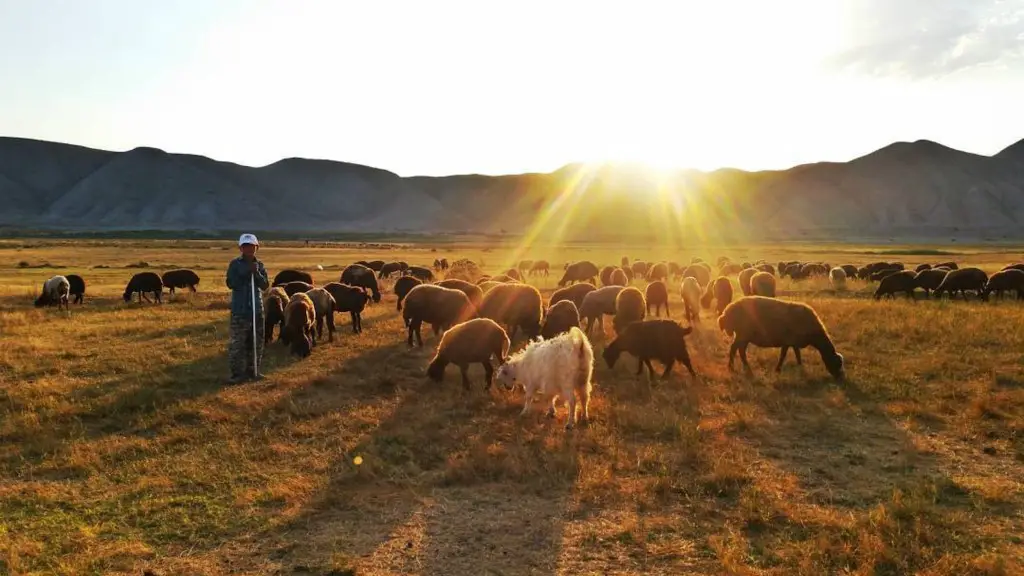Agriculture allowed humans to domesticated plants and animals which led to the settlement of areas and the development of civilizations. Agriculture provided a reliable source of food which allowed for the growth of populations. The invention of agricultural technologies such as irrigation and crop rotation greatly increased the productivity of farms and the food available to humans. Agriculture has also been a major source of employment and income for humans throughout history.
Agriculture allowed for the domestication of plants and animals, which led to the development of civilizations. Agriculture allowed for the growth of cities and the rise of civilizations. Agriculture led to the development of writing and the written word, which allowed for the growth of knowledge and the advancement of civilization.
How did agriculture help humans?
Denser populations can be supported by more abundant food supplies, and people who are tied to their land by farming can pursue other interests than worrying about food. Small settlements can grow into towns, and towns can grow into cities. Agriculture can produce enough food so that people are free to pursue other interests.
Agriculture is one of the most important inventions of humans. It has enabled us to grow all the food we need in one place, with a much smaller group of people. This has led to massive population growth, creating cities and trade.
How did agriculture changed human life
When early humans began farming, it allowed them to produce enough food that they no longer had to migrate to their food source. This meant they could build permanent structures, and develop villages, towns, and eventually even cities. Closely connected to the rise of settled societies was an increase in population. This led to more complex social structures, and the development of civilizations.
The Agricultural Revolution was a time of great change for farmers. They experimented with new crops and new methods of crop rotation. These new farming techniques gave soil time to replenish nutrients, leading to stronger crops and better agricultural output. Advancements in irrigation and drainage further increased productivity.
What are 3 benefits of agriculture?
Agriculture is the main source of raw materials for industries. It is also important to international trade. Agriculture plays a big role in a nation’s revenue. It provides employment. It is crucial to a country’s development. It can help heal the environment. Agriculture goes hand-in-hand with war.
Agriculture is the backbone of any economy and it is vital to ensure that it is sustainable. One way to do this is to increase biodiversity. This will lead to healthier soil, less erosion, better water conservation, and healthier pollinators. All of these things are essential to the success of agriculture.
How did agriculture affect human health?
Agriculture and food systems are a major source of negative health outcomes, including undernutrition, overnutrition, cancer, fertility, and digestive diseases. This is due to many factors, including the use of harmful chemicals and pesticides, the overuse of antibiotics, and the consumption of unhealthy foods. In order to improve our health, we need to address these issues at the source.
The main reason people in agricultural societies have a more settled lifestyle is because they live permanently near the land that they farm. This allows them to establish more permanent settlements, which leads to a more settled lifestyle. In contrast, people in nomadic hunter-gatherer or semi-nomadic pastoral societies often have to move around to find food and resources, which means they have a less settled lifestyle.
What were 3 positive changes from the Agricultural Revolution
The Second Agricultural Revolution had a profound impact on the world. It led to advances in food production, which in turn led to better diets, longer life spans, and an increase in population. As population increased, so did the pool for workers in industry. Since most of these jobs existed in cities and new factory towns, mass migration to urban areas began to unfold. This increased urbanization had a ripple effect on the world, leading to further advances in industry, transportation, and communication.
The Agricultural Revolution was a time of great change for humans. People who had been hunters and gatherers before were starting to become farmers. Farming allowed people to produce more food than they could actually eat. The extra food provided by agriculture meant that some people did not have to spend their time gathering food.
What are 2 positives of agriculture?
Agriculture plays an important role in society and the economy. It provides food for people to eat, jobs for people to do, and raw materials for products. It also helps to build strong economies through trade.
Agriculture is the backbone of Nigeria’s economy and the main source of livelihood for a majority of Nigerians. The sector accounts for about 40% of the country’s GDP and employs over 60% of the labor force.
The Nigerian agricultural sector has great potential for growth and development. The country has a large land area that is suitable for agriculture, and a climate that is conducive for the cultivation of a wide range of crops. Nigeria also has a large population that provides a ready market for agricultural products.
The Nigerian government has been working to strengthen the agricultural sector in recent years. A number of initiatives have been launched to promote agricultural production and to create more jobs in the sector.
The following are seven benefits of agriculture in Nigeria:
1. Production of export crops: Nigeria is a major producer of a number of export crops, such as cocoa, coffee, cotton, andrubber. These crops generate significant foreign exchange earnings for the country.
2. Agro tourism: Nigeria’s agricultural sector has great potential for agro tourism. The country has a variety of geographical features, such as forests, mountains, and rivers, that offer opportunities for eco-tourism.
3.
What are 5 important of agriculture
The present era of farming includes dairy, fruit, forestry, poultry beekeeping and arbitrary farming. However, agriculture could be referred to as promotion, processing, marketing, and distribution of crops and livestock products. The main aim of agriculture is to provide food for the people, but it also provides raw materials for many industries. It is the backbone of the economy of a country.
The agricultural industry is vitally important as it provides the world’s food supply. Crops and livestock are essential for meeting the daily dietary needs of both vegetarians and carnivores. The industry must therefore be managed effectively in order to maintain a reliable food supply.
What are pros and cons of agriculture?
Agriculture has been a key part of human development for centuries. It has allowed us to domesticate plants and animals, which has in turn led to the development of civilizations. Today, agriculture continues to be an important part of our lives, providing us with food and other resources. However, there are also some drawbacks to agriculture, such as conflicts over access to resources and damage from weather.
Agriculture is a critical part of the economy, providing food for people and raw materials for industry. It plays a major role in economic growth and development, and is a cornerstone of human existence.
What is positive in agriculture
There are many benefits to urban farming, including lower greenhouse gas emissions, minimized transportation requirements, and reduced energy use for food production. As the benefits are becoming more and more acknowledged, the trend of urban farming is starting to become quite popular.
There are many different ways to get involved in urban farming, from setting up a small garden in your backyard to joining a community garden or market garden. No matter what level you choose to get involved, you can be sure that you are making a positive impact on the environment.
The transition from a nomadic lifestyle to a more settled domestic one was a key moment in human history. By establishing homes and communities, families and larger groups were able to build societies and cultures that were not just dependent on foraging and hunting for survival. This shift allowed for the development of civilizations and the advancement of human knowledge and technology.
Final Words
The invention of agriculture was a major turning point in human history. Agriculture allowed for the domestication of plants and animals, which led to the establishment of permanent settlements and the development of civilizations. Agriculture provided a reliable source of food and allowed for the growth of cities and civilizations. Agriculture also had a number of other benefits for humanity, including the development of new technologies and the growth of trade and commerce.
There are many reasons why agriculture has been good for humans. For one, it has allowed us to settle down in one place and build communities. It has also given us a reliable source of food, which has allowed us to thrive and population to grow. Additionally, agriculture has allowed us to develop new technologies and understand the natural world better. Lastly, it has given us a way to express our creativity and artistry. All of these reasons together show why agriculture has been such an important part of human history and why it continues to be so important today.





